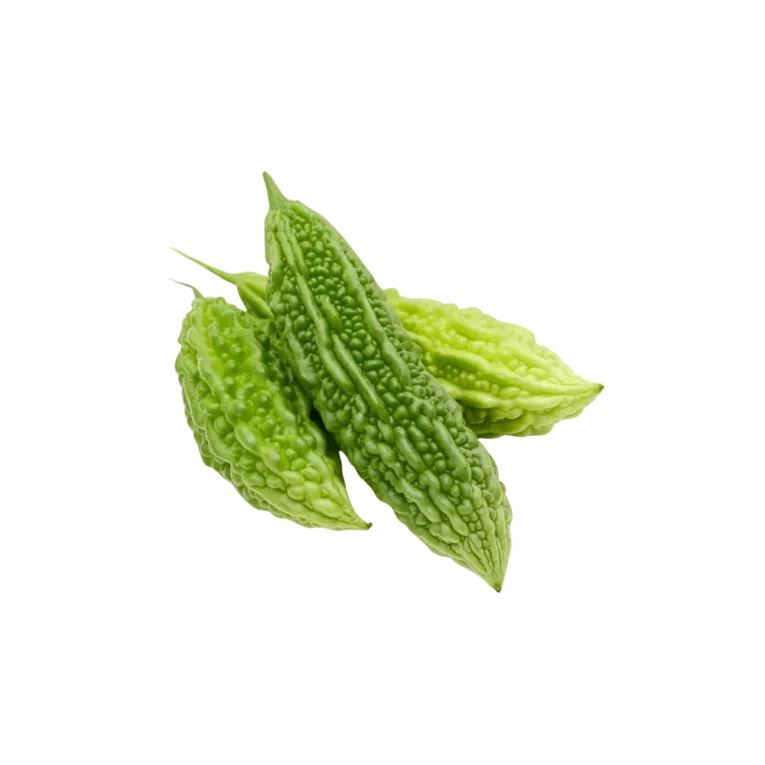What is Karela (Bitter Melon)?
Karela, or bitter melon, is a nutritious vegetable popular in South Asian, East Asian, and Caribbean cooking. It has a strong bitter flavour and is a green, spiky fruit packed with vitamins, antioxidants, and minerals. Karela has been used in Ayurvedic and traditional medicine for centuries for its benefits, such as lowering blood sugar, detoxifying the body, and boosting the immune system.
Its unique texture and bright green colour make it a standout vegetable. Many cultures view Karela as a natural remedy for digestive problems and high blood sugar.
When you choose Buy Fresh’s Karela, you get high-quality produce. We carefully select the best Karela to ensure you enjoy its freshness and authentic taste in every bite.
Key Features of Buy Fresh Karela (Bitter Melon)
- Available in Multiple Sizes: Choose from 250g, 500g, or 1kg packs to fit your needs, whether cooking for yourself or your family. Larger packs are great for meal prep and juicing.
- Farm-fresh quality: We carefully select and harvest each Karela to keep it fresh and nutritious. Every step from farm to kitchen ensures you get high-quality produce.
- 100% Natural & Pesticide-Free: Our bitter melons are grown without harmful chemicals using sustainable farming practices. Buy Fresh offers safe, eco-friendly produce.
- Rich in Nutrients: Karela is full of Vitamin C, Vitamin A, iron, calcium, potassium, and dietary fibre, offering many health benefits for your wellness goals.
- Ideal for Traditional & Modern Recipes: Use Karela in curries, stir-fries, juices, soups, or teas. Its versatility lets you try different cooking styles and healthy meals.
- UK-Wide Availability: Buy Fresh makes ordering and having Karela delivered to your home anywhere in the UK easy. Freshness and quality are just a click away!
Nutritional Benefits of Karela (Bitter Melon)
Supports Blood Sugar Management
Karela helps control blood sugar levels. Its compounds, like charantin and polypeptide-p, act like insulin, helping the body process glucose. For people with diabetes or those wanting stable blood sugar, adding Karela to your diet can make a big difference. Research shows it can help manage both Type 1 and Type 2 diabetes.
Boosts Immune System
Karela is high in Vitamin C, which strengthens the immune system and helps fight infections. Its antioxidants protect cells from damage and reduce stress. Bitter melon is a great choice if you want to stay healthy during seasonal changes.
Aids in Weight Loss
Karela is low in calories and fibre, making it a good option for weight management. It keeps you full longer, reduces cravings, and supports healthy digestion. Juicing bitter melon is also a popular way to curb appetite and help with fat loss naturally.
Detoxifies the Body
Bitter melon acts as a natural detoxifier. It cleans the liver, purifies the blood, and removes harmful toxins, helping you feel refreshed. A detox diet with Karela can boost your energy and overall health.
Promotes Healthy Skin and Hair
Karela contains vitamins and antioxidants that improve skin texture, reduce acne, and slow ageing. It also strengthens hair follicles, reducing hair loss and promoting shiny hair. Many natural remedies use Karela juice or extracts for healthier skin.
Enhances Digestive Health
Karela supports digestion by boosting the production of digestive enzymes. Its high fibre content helps maintain regular bowel movements and prevents constipation. If you experience bloating or indigestion, Karela is a gentle and effective option.
Ways to Use Karela (Bitter Melon)
Bitter melon is a flexible vegetable used in many dishes to match your taste and health needs. Here are some easy ways to prepare and enjoy Karela:
Karela Juice for a Healthy Morning Detox
Blend fresh bitter melon with lemon juice and a little salt for a healthy detox drink. Karela juice gives you a great start to your day and is popular among fitness fans for its cleansing benefits.
Traditional Karela Curry
Cook Karela with onions, tomatoes, and spices for a tasty South Asian curry. Serve it with rice or roti for a nutritious meal. This dish balances the bitterness and offers a rich flavour.
Stir-Fried Karela
Slice Karela and stir-fry it with turmeric, garlic, and onions for a quick side dish. This method reduces bitterness while keeping its nutrients. You can add cumin seeds for extra flavour.
Karela Chips
For a healthy snack, thinly slice Karela, season it and bake or air fry until crispy. These chips are crunchy, nutritious, and perfect for snacking!
Bitter Melon Tea
Dry Karela slices and steep them in hot water for a herbal tea that helps digestion and manages blood sugar. You can add honey for sweetness.
Stuffed Karela
For a tasty traditional dish, Stuff Karela with lentils, onions, and tomatoes. This method enhances the flavour while maintaining its nutritional benefits.
Why Choose to Buy Fresh for Your Karela (Bitter Melon)?
At Buy Fresh, we promise to bring the best fresh produce to your home. When you buy Karela from us, you can be sure you’re getting the finest bitter melon in the UK.
- Freshness Guaranteed: We focus on quality and freshness with every order. Our packaging keeps Karela in great condition when it arrives at your home.
- Sustainable Farming Practices: We grow Karela using eco-friendly and pesticide-free methods, making it healthier for you and the planet.
- Convenient Delivery: Our fast delivery service brings fresh Karela to you anywhere in the UK. Freshness is just a click away!
- Affordable Pricing: Our Karela comes in 250g, 500g, and 1kg packs to fit any budget and dietary needs.
- Customer Satisfaction: We care about our customers and aim to provide the best quality produce whenever you shop with us.
Why Karela is a Superfood You Need in Your Diet
Karela, or Bitter Melon, is a superfood with nutrients and health benefits. Adding Karela to your meals can boost your immunity, help control blood sugar and aid digestion. Karela is a great natural option whether you have a specific health issue or want to live healthier. It offers high nutrition with few calories, making it essential for anyone focused on health.
Buy Fresh Karela – Perfect for Health Enthusiasts and Traditional Cooks
If you love fresh and nutritious food, Karela is a great choice. Its unique flavour and health benefits appeal to health-conscious people and cooking fans. Add it to juices, curries, teas, or snacks to enjoy its versatility daily.
Shop Now for Fresh Karela (Bitter Melon)
Don’t miss the amazing benefits of Karela. Our fresh Karela is available in 250g, 500g, and 1kg packages, ready to enhance your meals and boost your health. Order now from Buy Fresh for delivery anywhere in the UK. Try this superfood today!












Reviews
There are no reviews yet.